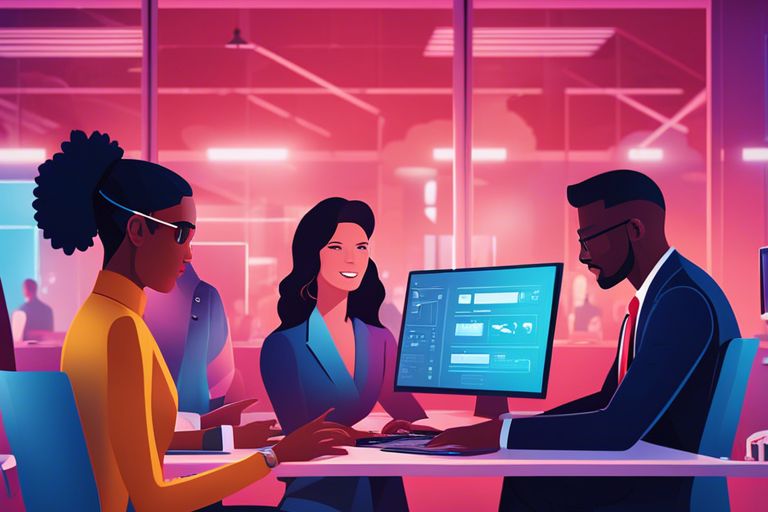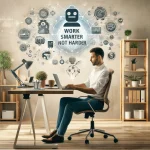Just as industries evolve with technological advancements, you might wonder how artificial intelligence (AI) is shaping the workforce landscape today. This blog post will explore the ways AI is not only transforming existing jobs but also creating new roles that enhance job diversity and opportunity. By understanding the potential impacts of AI on your career path and the broader job market, you can better navigate these changes and seize the opportunities that lie ahead.
Key Takeaways:
- Job Automation: AI is transforming traditional roles, leading to job displacement in some sectors while creating new opportunities in others.
- Skill Demand: The rise of AI technologies necessitates a shift in skills, emphasizing the need for continuous learning and adaptability in the workforce.
- Diverse Opportunities: AI can open doors to a wider range of jobs, especially in fields related to data analysis, machine learning, and AI ethics.
- Inclusivity: AI has the potential to foster a more inclusive job market by creating roles that accommodate various skill levels and backgrounds.
- Collaborative Work: AI encourages collaboration between humans and machines, leading to enhanced productivity and innovative job roles that leverage both human creativity and machine efficiency.
Understanding AI and Its Impact on Employment
Defining Artificial Intelligence
To understand the implications of AI on job opportunities, you must first grasp what artificial intelligence truly encompasses. Artificial intelligence refers to the simulation of human intelligence in machines that are programmed to think like humans and mimic their actions. This can include everything from basic tasks, such as data entry and processing, to more complex operations like decision-making and problem-solving. As AI technology progresses, it continues to take on more intricate roles that were once exclusively reserved for human workers.
Understanding AI also involves recognizing its various forms, including machine learning, natural language processing, and robotics. Each of these forms of AI can redefine the scope of employment, facilitating improved efficiency and productivity. By leveraging AI, businesses can automate routine tasks, freeing up humans to focus on more strategic and creative endeavors.
Historical Context of AI in the Workforce
Context is important when discussing AI’s influence on jobs, as it helps you appreciate the evolution of AI technologies and their integration into various sectors. The journey of AI dates back to the mid-20th century when pioneers began exploring the concept of machine learning and cognitive function. Fast-forward to the 21st century, advancements in computing power and data availability have ignited a renaissance in AI development, reshaping industries and workforce dynamics.
The historical context reveals that AI has been a tool for augmentation rather than outright replacement for many years. Initially, automated systems were designed to enhance human workers’ capabilities, allowing them to accomplish tasks more efficiently. As you look back at the development of AI, you can see it has historically been integrated to complement the human workforce, gradually introducing new skill sets and job roles that adapt to the changing technological landscape.
The Shift in Job Market Dynamics
Artificial intelligence is reshaping job market dynamics in both positive and challenging ways. As AI systems become increasingly capable, you may find entire job categories rendered obsolete, while simultaneously creating new opportunities in fields such as AI maintenance, programming, and ethics. This duality places a responsibility on you as a worker to continually adapt and expand your skill set in order to remain relevant in a rapidly changing job environment.
This transformation indicates a broader trend where traditional roles evolve into hybrid positions that require human-AI collaboration. The emergence of AI doesn’t merely eliminate jobs; instead, it necessitates a re-examination of role descriptions, paving the way for higher-level positions that demand creativity, critical thinking, and interdisciplinary skills. As you navigate this shift, staying informed and agile in your career path becomes crucial to harnessing the benefits of AI’s integration into the workforce.
Job Diversity Enabled by AI
The rise of artificial intelligence (AI) technologies is not only transforming the way businesses operate but also significantly enhancing job diversity and creating new opportunities across various sectors. As AI continues to integrate into daily operations, you will find that a wide array of roles is emerging that require specialized skills and knowledge, ultimately enriching the workforce landscape. This transformation paves the way for individuals from different backgrounds and expertise to contribute to the evolving business environment.
New Roles Created by AI Technologies
One of the most notable impacts of AI is the creation of entirely new roles that were previously non-existent. Positions such as AI trainers, data ethicists, and automation specialists have entered the job market, demonstrating a growing demand for expertise in AI technologies. These roles require a unique blend of technical know-how and a strong grasp of ethical implications in AI implementation, thus attracting professionals from various fields to innovate and adapt. As companies increasingly rely on AI systems, the need for skilled individuals to manage these technologies will only expand, offering a wealth of career options for you to consider.
Upskilling and Reskilling Opportunities
To thrive in this new landscape of job diversity, upskilling and reskilling will be important for your career advancement. Many organizations are investing in training programs to equip their employees with necessary skills to leverage AI effectively. Through workshops, online courses, and collaborations with educational institutions, you can enhance your skill set to meet the growing demands of the job market. Not only does this provide you with the opportunity to stay relevant, but it also empowers you to take on more complex and rewarding roles that may emerge as the AI landscape evolves.
Opportunities for upskilling and reskilling are abundant, allowing you to pivot into new roles as industries adapt to AI-driven changes. From learning to manage AI tools to understanding the ethics of AI deployment, these educational paths enable you to redefine your career trajectory. This continual growth fosters a culture of lifelong learning, encouraging you to embrace adaptability and responsiveness in the face of ever-changing job demands.
Enhancing Workforce Inclusivity
Opportunities arise when you consider the inclusivity benefits that AI brings to the workplace. By automating repetitive tasks and streamlining processes, AI allows diverse talent to showcase their competencies in a range of fields. This shift enables organizations to broaden their talent pool, emphasizing diversity in recruitment strategies and ensuring that everyone, regardless of their background, has a fair chance to succeed. Consequently, you may find yourself entering roles that previously seemed out of reach, as AI helps level the playing field.
Created through the implementation of AI technologies, a more inclusive workforce is not just a possibility; it is increasingly becoming a reality. Companies are recognizing the value of diverse perspectives, which can drive innovation and creativity. By embracing AI, firms can cultivate an environment where your unique experiences and viewpoints are not only valued but also important to their success. This helps foster a culture that prioritizes collaboration and mutual growth among all members of the workforce.
Challenges and Considerations
Unlike the optimistic view that AI will create more opportunities, there are significant challenges and considerations that must be addressed to ensure a balanced outcome for the workforce. As technology continues to evolve, it is crucial for you to understand both the potential benefits and the risks associated with the implementation of AI in the workplace. As organizations increasingly rely on AI tools and systems, it is imperative to explore the multifaceted repercussions on employment dynamics and job roles.
Job Displacement Risks
One of the most pressing concerns surrounding AI implementation is the potential for job displacement. As machines become capable of performing tasks traditionally executed by humans, you may find that certain roles become obsolete. Industries such as manufacturing, retail, and customer service are already experiencing shifts due to automation. This challenge raises questions about the long-term sustainability of certain job markets and the anxiety many workers feel about their future.
One effective approach to mitigate job displacement risks involves fostering a culture of continuous learning and upskilling. You, as a professional, can take proactive measures to stay relevant in an evolving job landscape. Embracing lifelong learning and acquiring new skills that complement AI technology will better position you to thrive in an increasingly automated world.
Ethical Implications of AI in Hiring
On the other hand, as organizations begin to adopt AI-driven recruitment processes, ethical implications emerge that you should consider. AI systems can streamline hiring, reduce bias, and identify top talent more effectively. However, when algorithms are biased or built on flawed data sets, they can inadvertently reinforce societal inequalities. As you engage with AI in your work environment, it is important to remain vigilant regarding the potential for bias and the impact that it could have on candidate selection.
Plus, the transparency of AI algorithms is another critical aspect. You need to advocate for clear explanations of how AI systems make their decisions in hiring processes. This information is vital to ensure that all candidates are evaluated fairly and that organizations uphold ethical standards during recruitment.
Managing Workforce Transition
Considerations surrounding workforce transition are paramount as you navigate an AI-influenced labor market. It is important for businesses to create and implement comprehensive strategies that address the changing landscape of employment. By fostering open communication and providing support to your employees, organizations can help ease the transition and minimize feelings of insecurity that may arise from AI integration.
It is equally important for you and your organization to collaborate with educational institutions and training providers to ensure that relevant skills are being developed within your workforce. Engaging in partnerships to create tailored training programs that align with emerging job roles will enhance your adaptability and resilience in the face of ongoing technological change.
Future Outlook
Now, as we stand on the cusp of a transformative era, it’s important to consider how AI will shape your professional landscape in the coming years. The rapid advancement in AI technologies is expected to bring about significant evolution in job roles, with a shift towards tasks that require human ingenuity and emotional intelligence, while automating routine and repetitive functions. This evolution presents an opportunity for you to adapt your skills and focus on higher-level cognitive tasks that add value in the workplace.
Predictions for Job Evolution
Outlook experts suggest that by 2030, a substantial portion of jobs will be complemented or even created by AI-driven innovations. Roles that incorporate AI and data analysis will likely see increased demand, while industries focusing on creativity, problem-solving, and strategic thinking will flourish. You may find that your ability to leverage AI tools can set you apart in a competitive job market, allowing you to embrace a diverse range of opportunities that were previously unavailable.
Strategies for Leveraging AI for Opportunity
Future-oriented professionals are already seeking ways to gain a competitive edge by understanding and integrating AI into their skill sets. To thrive in the AI-enhanced job market, you should focus on continuous learning and professional development. Embracing AI training programs, workshops, or online courses can provide you with necessary expertise and adaptability. Furthermore, collaborating with AI technologies can lead to the discovery of innovative solutions within your field.
Strategies you employ to leverage AI’s potential should include a proactive approach to skill acquisition and networking with experts in the field. Engaging in communities centered around AI will not only keep you informed of emerging trends but may also enhance your collaboration prospects. As you navigate this evolving landscape, ensure you’re staying abreast of developments in AI technologies that can augment your own professional capabilities.
The Role of Policy in Shaping AI’s Impact
One crucial aspect of the AI discourse revolves around the policies that govern its implementation and ethical usage. As AI technologies advance, you must be aware of how regulations and guidelines can shape your industry. Policymakers have the responsibility to create frameworks that ensure equitable access to opportunities created by AI, while also addressing potential job displacement concerns. Engaging with policymakers or lobbying for responsible AI practices can be beneficial not only for your career but for the broader workforce as well.
Predictions indicate that effective policies will play a crucial role in navigating the balance between job creation and displacement. You should consider advocating for training and reskilling programs that equip workers with the skills necessary to thrive in the AI era. By actively participating in discussions concerning AI governance and supporting initiatives that promote inclusive growth, you can help influence the direction in which these technologies evolve, ensuring they contribute to a diverse and equitable job market.
Conclusion
Following this exploration of how artificial intelligence is reshaping the labor market, it’s clear that you stand at the threshold of a new era filled with both challenges and opportunities. AI is not merely a tool for enhancing efficiency; it is a transformative force that can drive unprecedented job diversity. You may find that your current skill set might require adaptation, but this shift also opens doors for you to engage in tasks and roles that didn’t exist previously. Embracing these changes allows you to leverage AI technologies, thus positioning yourself to thrive in a dynamic employment landscape.
As you consider your professional trajectory, remember that AI’s potential to create diverse job opportunities is accompanied by the necessity for continual learning and adaptability. By cultivating skills that complement AI tools, you give yourself the best chance to navigate this evolving terrain. The question isn’t whether AI will create job opportunities, but rather how you will seize them. Your proactive approach toward embracing innovation in your field can empower you to lead rather than follow, ultimately contributing to a more versatile and rewarding career path.




